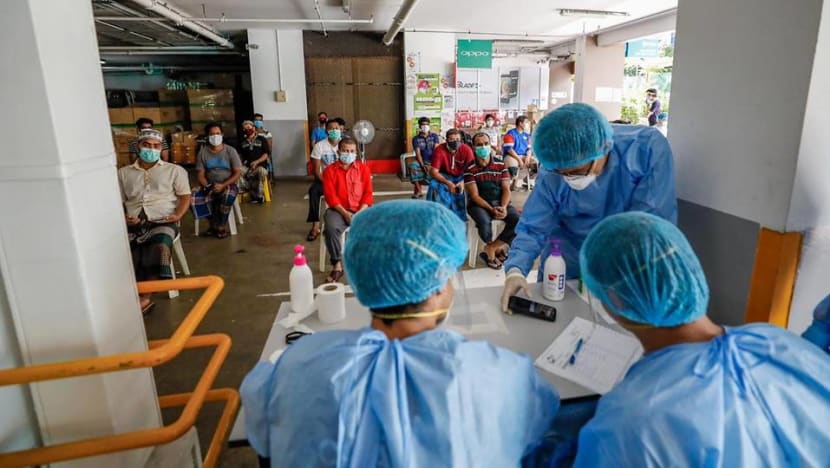Experts call for stronger community resilience as next step in Singapore’s mental health journey
Despite broader access and growing awareness, a shortage of trained professionals remains a critical gap, experts say.


This audio is generated by an AI tool.
SINGAPORE: Francis Fong was only four when waves tore through a resort in the Thai seaside town of Krabi, sweeping him and his pregnant mother away during a family holiday on Boxing Day in 2004.
Moments earlier, a powerful 9.1-magnitude earthquake in the Indian Ocean had unleashed a tsunami that would claim about 230,000 lives across more than a dozen countries.
“At that time, I think it all happened in a blur. It happened quite suddenly,” recalled Mr Fong, now 25.
“We just heard someone shouting in the distance, and then when we looked out, we saw one huge wave coming towards us,” he added.
“I was still young; I didn’t really understand what was happening. But my mum actually grabbed my hand and she started running, and that was the time the first wave hit.”
The mother-and-son pair fortunately managed to survive by clinging to a nearby rock.
For years after, the incident made Mr Fong afraid of the water. But he eventually faced his fear, learning to swim – and even representing Singapore at the 2017 Southeast Asian Games.
Even now, the memories can still come crashing back.
“It was quite an arduous journey,” he told CNA.
“Initially, I still remember when I was swimming, sometimes there would be sort of like panic attacks where I would actually feel I'm suddenly gasping for air as I recall what happened.
“Sometimes I would just be thinking about what happened on the day itself, and then my heart rate would go a bit faster. So I think definitely, psychologically, it did have an impact in my younger days.”
His story reflects Singapore’s growing recognition of the need to build emotional resilience within communities.

Observers say such strength is cultivated close to home – through peer support, mental health first aid training, and outreach to vulnerable groups – linking national policy with daily care and fostering emotional readiness in times of crisis.
That resilience was tested during the COVID-19 pandemic, a stark reminder of how quickly both individual and national mental health can be shaken.
In Singapore, tens of thousands of migrant workers, for instance, were confined to their rooms – isolated and uncertain.
Lockdowns slowed the spread of the coronavirus, but they also unleashed a wave of mental health struggles.
Ms Durga Ativan, head of counselling and social services at charity HealthServe, said the concept of quarantine was new and was “definitely stressful” for the workers.
“There were moments where they lost their parents. Some of them were about to get married that year but they couldn't go on time for that, so some marriages were broken during COVID,” she added.
“So this led to a lot of depressive thoughts. We handle many cases, from simple stress to major depressive disorders as well during this time … There were a lot of self-harm thoughts, suicidal ideations that were appearing as well.”
Ms Durga emphasised the importance of raising awareness among migrant workers and breaking down the stigma surrounding mental health support.
NURTURING EMOTIONAL READINESS
Observers said Singapore has made mental health a national priority, as reflected in recent policies and efforts to expand access to support services.
Singapore has launched a National Mental Health and Well-being Strategy to strengthen the mental health ecosystem, ensuring that those in need can seek help without stigma and receive the support they need for recovery.
A National Mental Health Office has also been established to oversee the implementation of this strategy and drive future developments in mental health care.
Dr Rayner Tan, assistant professor at the National University of Singapore’s Saw Swee Hock School of Public Health, noted that Singapore is in a “pretty good position” on this front, but more work remains to be done.
Despite broader access and growing awareness, experts say there remains a shortage of trained professionals.
“I think the policies have created pathways for people to gain access to knowledge and services,” said Dr Tan, who is also a co-lead at community initiative SG Mental Health Matters.
“But in terms of implementation and having the people there to provide these services and to provide competent care, I think that's where we still have some ways to go in terms of building that,” he added.
Dr Tan said that beyond formal care providers, communities need to be strengthened to enable people to support one another.
Experts also stressed that nurturing emotional preparedness is equally crucial.
“Teaching youth how to recognise distress, listen without judgment and offer support will not only nurture early awareness and resilience, but also normalise help-seeking at a young age,” said Ms Azlitah Jaffar, senior lead counsellor at Intellect Clinic, which provides counselling and therapy services.
“This prepares the next generation, not just academically but emotionally, for life's inevitable challenges.”


















